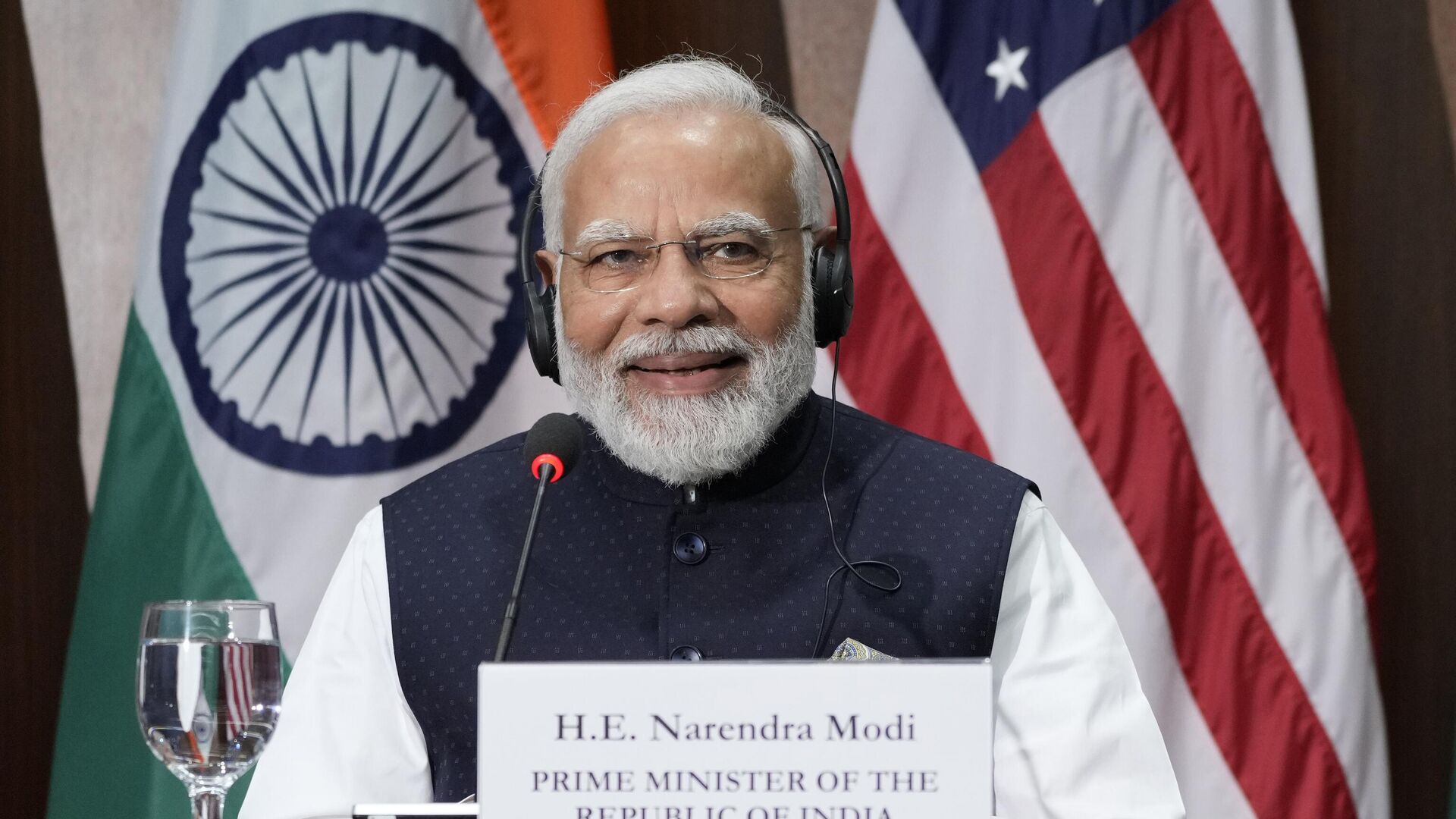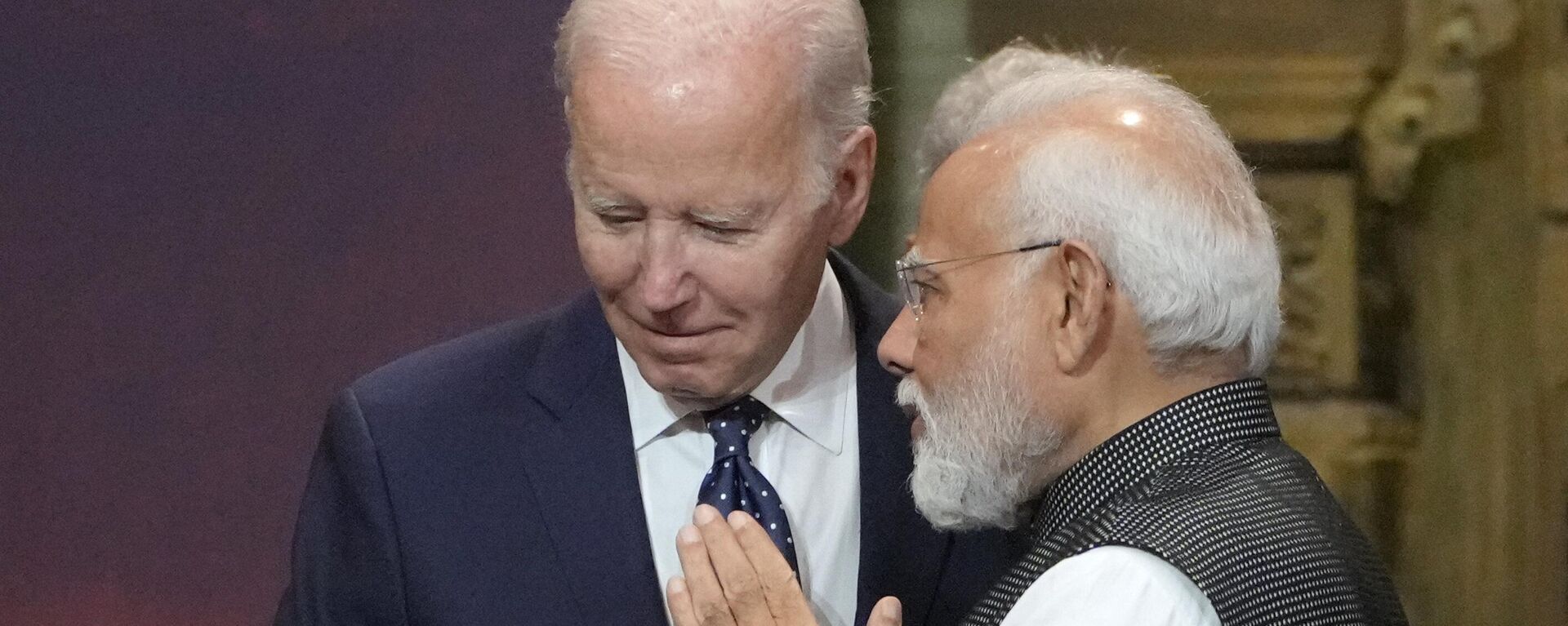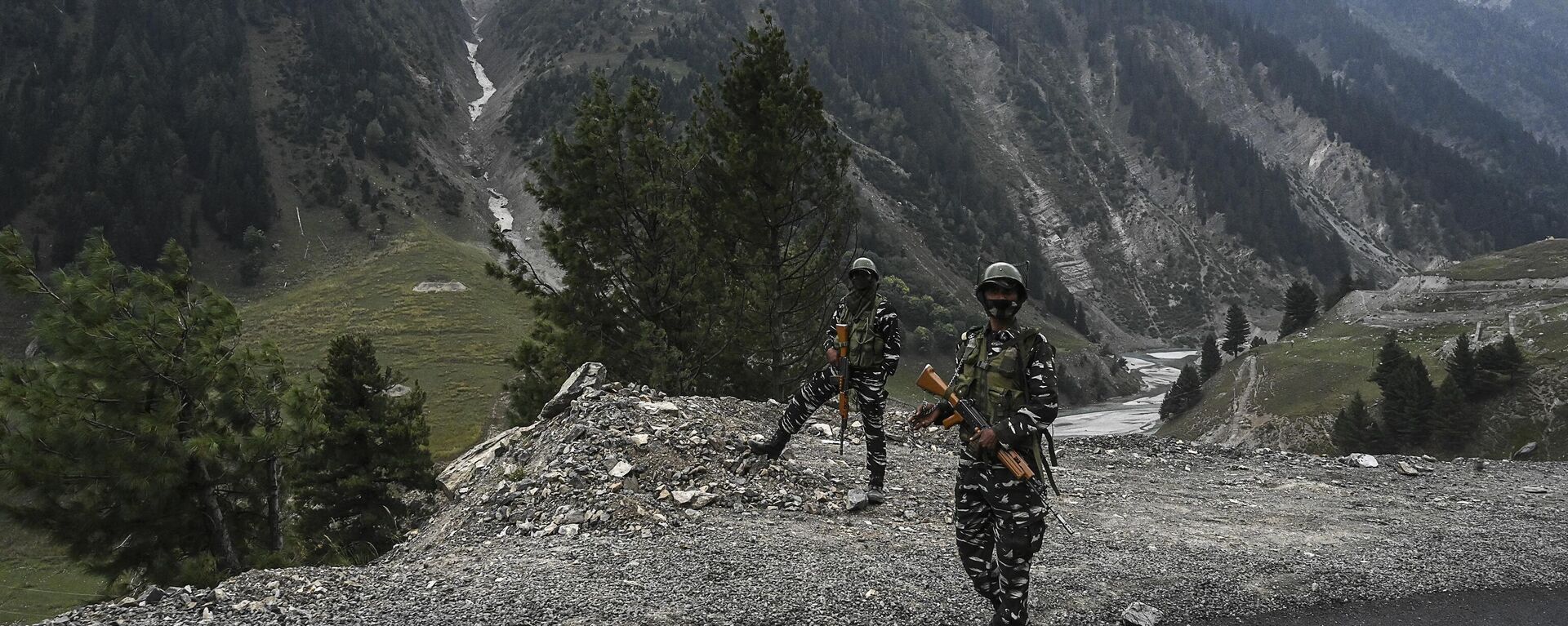https://sputniknews.in/20230622/unlike-us-indias-national-security-not-premised-on-rivalry-with-china-academic-2611378.html
Unlike US, India’s National Security Not Premised on Rivalry With China: Academic
Unlike US, India’s National Security Not Premised on Rivalry With China: Academic
Sputnik India
The “strategic interests” of India and the US over China “do not converge completely”, an American academic has told Sputnik.
2023-06-22T15:19+0530
2023-06-22T15:19+0530
2023-06-22T15:19+0530
sputnik opinion
india
us
china
russia
narendra modi
joe biden
white house
indo-pacific
ladakh
https://cdn1.img.sputniknews.in/img/07e7/06/16/2616141_0:0:3072:1728_1920x0_80_0_0_8150bcc32c45b2d1a3d1beb02886a8bb.jpg
The strategic interests of India and the US over China “do not converge completely”, an American academic has told Sputnik ahead of a crucial meeting between Indian Prime Minister Narendra Modi and US President Joe Biden at the White House on Thursday.Professor Zhiqun Zhu, a professor of political science and international relations, at Bucknell University, underlined that the US considered China as a “global challenger”, while Beijing was more of a “regional rival” for New Delhi for now in view of the ongoing border dispute in the eastern Ladakh region.Zhu remarked that the US has been engaged in a “zero-sum competition” with China, a policy which has remained the same since the previous Trump administration.The ‘US Strategic Framework for the Indo-Pacific’ de-classified by the erstwhile Trump administration in 2021 described India as Washington’s “preferred partner” to “counter Chinese influence in south and southeast Asia”.The National Security Strategy (NSS) unveiled by the Biden administration labels China as the “most consequential geopolitical challenge”. It describes Russia as an “immediate threat”.For its part, New Delhi has never published a formal national security doctrine. However, for most part of its post-Independence history, India has followed a policy of “non-alignment (in the Cold War), which is now described as “strategic autonomy”.Zhu noted that New Delhi has refused to vote against Russia at the United Nations (UN) in the wake of Moscow’s special military operation in Ukraine.Modi’s Policy Towards China Has Left Biden ‘Disappointed’Zhu noted that the Biden administration and members of US Congress would want India to play a “more active role in the US Indo-Pacific strategy”, which includes positioning India as an alternative to China in the global supply chains.Although India is a member of the US-led Quad grouping also comprising Washington’s treaty allies Australia and Japan, New Delhi has been wary of imparting a military or security dimension to the grouping.Zhu endorsed the view that India remained the “weakest link” in US’ vision for the Quad grouping.He said that India has been working closely with both China and Russia in multilateral groupings such as the Shanghai Cooperation Organization (SCO) and BRICS.New Delhi has also rejected an offer from Washington to mediate in its ongoing border differences with China and has maintained that the dispute would be resolved bilaterally between the two Asian neighbours.China, along with the US, ranks among India’s biggest trading partners, with both the countries being leading members advocating for interests of low and middle-income nations of Global South.Washington Unlikely to Succeed in Ruining Indo-Russian TiesZhu also stated that it was unlikely for the Biden administration to convince India to “wean off Russian defense supplies”. India has sourced nearly 50 percent of its military supplies from Moscow in 2017-2021.The US, whose share of defense exports to India has surged to $20 billion from near zero 20 years ago, has been urging New Delhi to reduce its reliance on Russian supplies as it seeks more orders for American defense contractors.But military experts have time and again emphasized the criticality of Russian defense equipment to India’s national security interests, including that of S-400 surface-to-air missiles, Brahmos supersonic missiles and Su-30 fighter jets.Over the last year, India has also cultivated a significant energy partnership with Russia, which now ranks as the biggest supplier of crude to New Delhi.
https://sputniknews.in/20230620/india-never-going-to-be-americas-junior-partner-analyst-says-2583879.html
https://sputniknews.in/20230425/speed-up-settlement-of-ladakh-dispute-beijing-says-ahead-of-defence-ministers-india-visit-1678140.html
india
us
china
russia
indo-pacific
ladakh
Sputnik India
feedback.hindi@sputniknews.com
+74956456601
MIA „Rossiya Segodnya“
2023
Dhairya Maheshwari
https://cdn1.img.sputniknews.in/img/07e6/0c/13/138962_0:0:641:640_100x100_80_0_0_2cb44360dbcdf6d84bf4b299cd045917.jpg
Dhairya Maheshwari
https://cdn1.img.sputniknews.in/img/07e6/0c/13/138962_0:0:641:640_100x100_80_0_0_2cb44360dbcdf6d84bf4b299cd045917.jpg
News
en_IN
Sputnik India
feedback.hindi@sputniknews.com
+74956456601
MIA „Rossiya Segodnya“
Sputnik India
feedback.hindi@sputniknews.com
+74956456601
MIA „Rossiya Segodnya“
Dhairya Maheshwari
https://cdn1.img.sputniknews.in/img/07e6/0c/13/138962_0:0:641:640_100x100_80_0_0_2cb44360dbcdf6d84bf4b299cd045917.jpg
modi us visit, modi in us, modi news, modi biden, modi foreign policy, modi on russia ukraine, modi russia, india china relations, india china border dispute, india china news
modi us visit, modi in us, modi news, modi biden, modi foreign policy, modi on russia ukraine, modi russia, india china relations, india china border dispute, india china news
Unlike US, India’s National Security Not Premised on Rivalry With China: Academic
The situation in Indo-Pacific is expected to be a major area of focus during bilateral talks at the White House between US President Joe Biden and Indian Prime Minister Narendra Modi, who is on a state visit to the US.
The strategic interests of India and the US over China “do not converge completely”, an American academic has told Sputnik ahead of a crucial meeting between Indian Prime Minister Narendra Modi and US President Joe Biden at the White House on Thursday.
Professor Zhiqun Zhu, a professor of political science and international relations, at Bucknell University, underlined that the US considered China as a “global challenger”, while Beijing was more of a “regional rival” for New Delhi for now in view of the
ongoing border dispute in the
eastern Ladakh region.
“India, though concerned about China’s expanding power, still shares many interests with China as developing nations. Notably, India’s national security is not built upon competition with China,” Zhu underlined.
Zhu remarked that the US has been engaged in a “zero-sum competition” with China, a policy which has remained the same since the previous Trump administration.
The ‘US Strategic Framework for the Indo-Pacific’ de-classified by the erstwhile Trump administration in 2021 described India as Washington’s “preferred partner” to “counter Chinese influence in south and southeast Asia”.
The National Security Strategy (NSS) unveiled by the Biden administration labels China as the “most consequential geopolitical challenge”. It describes Russia as an “immediate threat”.
For its part, New Delhi has never published a formal national security doctrine. However, for most part of its post-Independence history, India has followed a policy of “non-alignment (in the Cold War), which is now described as
“strategic autonomy”.Zhu noted that New Delhi has
refused to vote against Russia at the United Nations (UN) in the wake of Moscow’s
special military operation in Ukraine.
Modi’s Policy Towards China Has Left Biden ‘Disappointed’
Zhu noted that the Biden administration and members of US Congress would want India to play a “more active role in the
US Indo-Pacific strategy”, which includes positioning India as an alternative to China in the global supply chains.
“However, India has been ambiguous and ambivalent in its China policy. Perhaps to the disappointment of the Biden administration, India has not thrown its full support behind the US Indo-Pacific strategy,” he stated.
Although India is a member of the US-led Quad grouping also comprising Washington’s treaty allies Australia and Japan, New Delhi has been wary of imparting a military or security dimension to the grouping.
Zhu endorsed the view that India remained the “weakest link” in US’ vision for the Quad grouping.
“India is unlikely to ditch its longstanding non-alignment policy and fully join the US to counter China or Russia. Perhaps Washington needs to lower its expectations of India’s role in containing China, especially in security and military dimensions,” the professor reckoned.
He said that India has been working closely with both China and Russia in multilateral groupings such as the Shanghai Cooperation Organization (SCO) and BRICS.
New Delhi has also rejected an offer from Washington to mediate in its ongoing border differences with China and has maintained that the dispute would be resolved bilaterally between the two Asian neighbours.
China, along with the US, ranks among India’s biggest trading partners, with both the countries being leading members advocating for interests of low and middle-income nations of Global South.
Washington Unlikely to Succeed in Ruining Indo-Russian Ties
Zhu also stated that it was unlikely for the Biden administration to convince India to
“wean off Russian defense supplies”. India has sourced nearly 50 percent of its military supplies from Moscow in 2017-2021.
The US, whose share of defense exports to India has surged to $20 billion from near zero 20 years ago, has been urging New Delhi to reduce its reliance on Russian supplies as it seeks more orders for American defense contractors.
But military experts have time and again emphasized the
criticality of Russian defense equipment to
India’s national security interests, including that of S-400 surface-to-air missiles, Brahmos supersonic missiles and Su-30 fighter jets.
Over the last year, India has also cultivated a significant energy partnership with Russia, which now ranks as the biggest supplier of crude to New Delhi.




